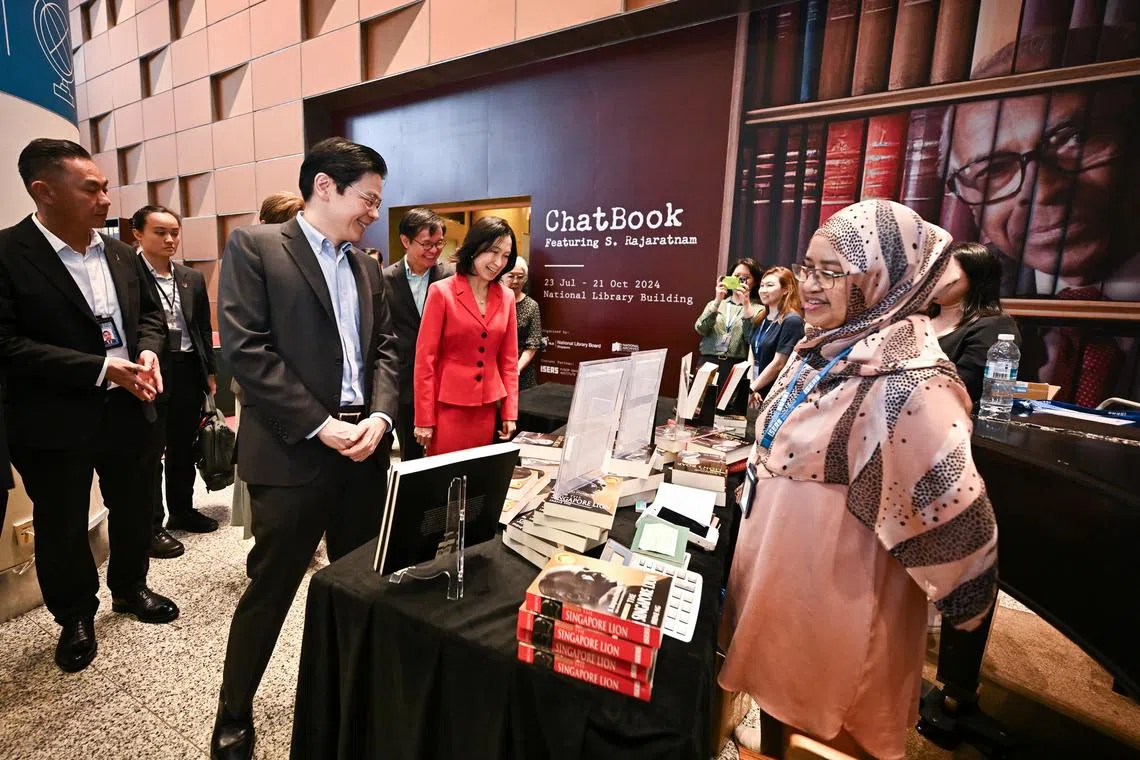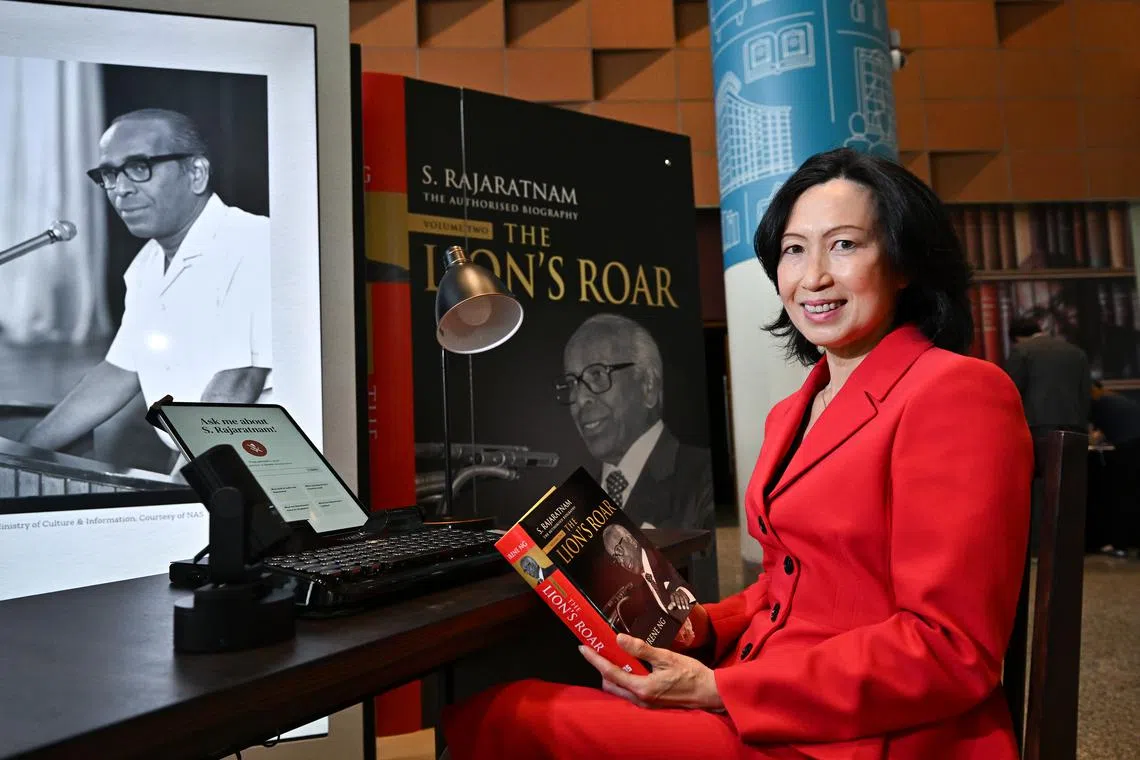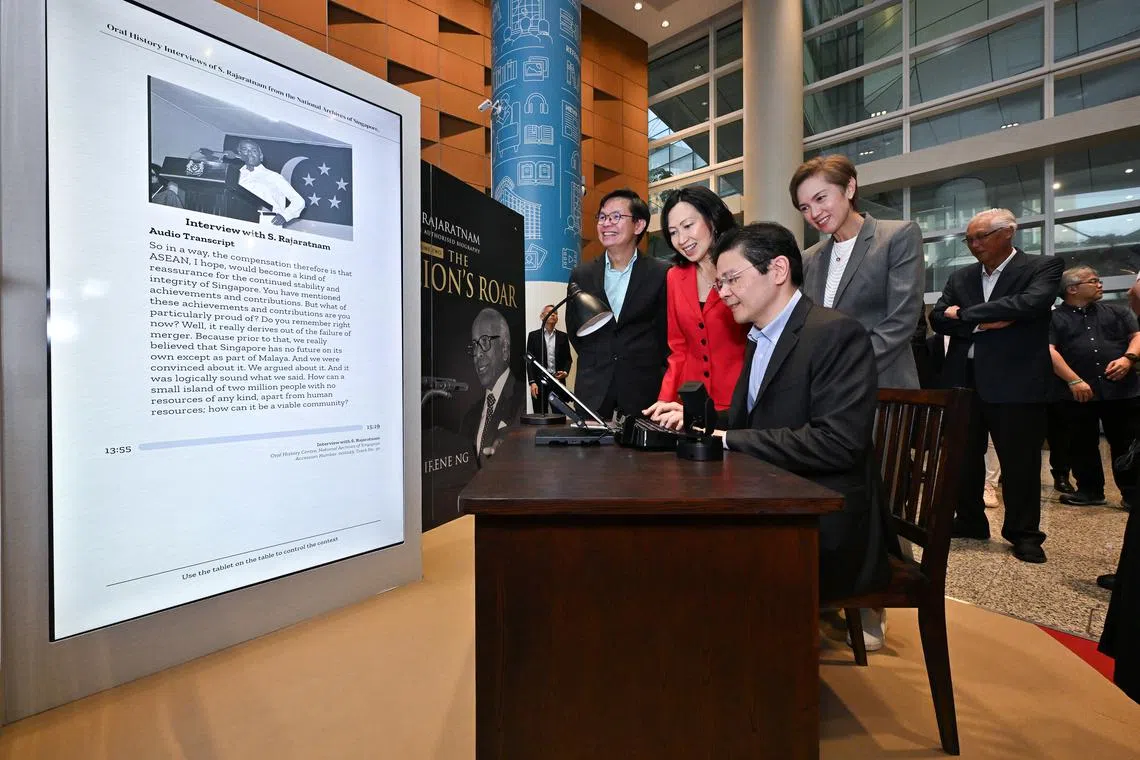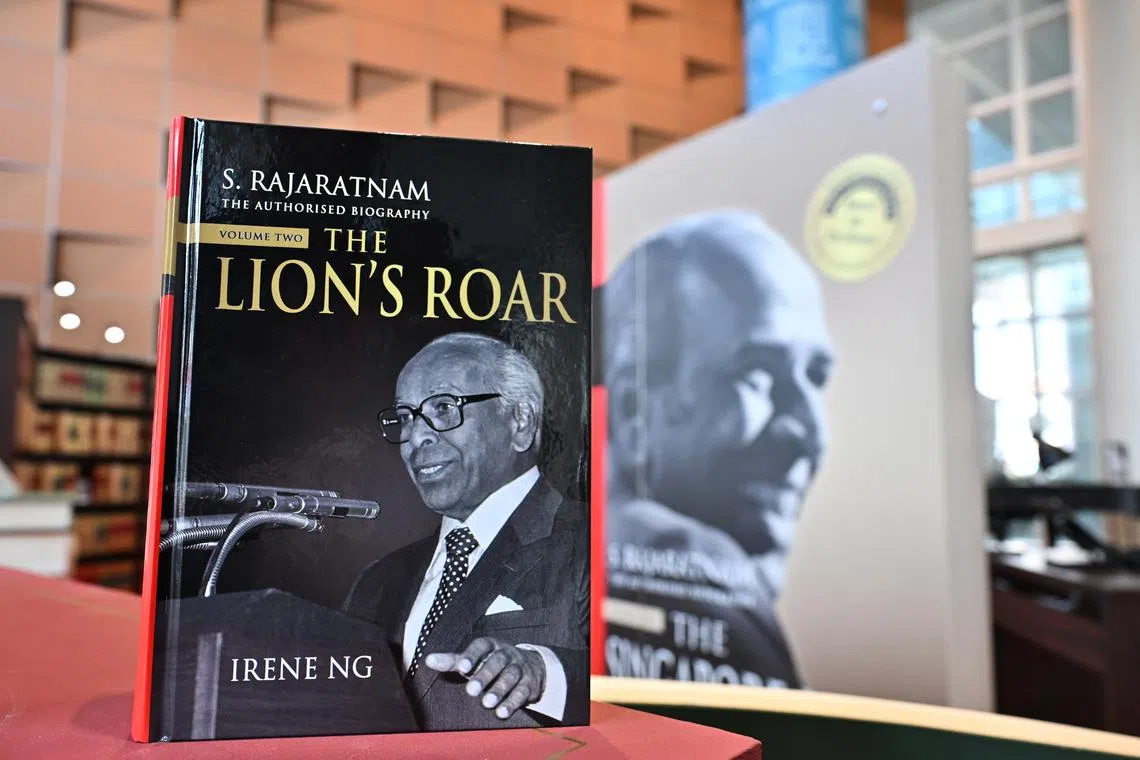Singapore cannot exist other than as an island city-state connected to the world: PM Wong
Sign up now: Get ST's newsletters delivered to your inbox

Prime Minister Lawrence Wong and former MP and journalist Irene Ng at the ChatBook showcase at National Library Building on July 22.
ST PHOTO: LIM YAOHUI
SINGAPORE – A global city that could overcome its small size and lack of hinterland by plugging into networks worldwide – that is how first-generation Cabinet minister S. Rajaratnam envisioned Singapore in 1972. The country grew and prospered when globalisation took off, as he predicted.
As Singapore faces nativist and protectionist pressures today, staying open is not just essential but existential, said Prime Minister Lawrence Wong.
“Singapore cannot exist other than as an island city-state connected to the world,” PM Wong said on July 22 at the launch of the second volume of Mr Rajaratnam’s biography titled The Lion’s Roar.
Reflecting on the life and legacy of Mr Rajaratnam, PM Wong said Singapore’s first foreign minister was ahead of his time when he outlined – in a speech to the Singapore Press Club in February 1972 – how the Republic’s transformation into a global city, enabled by modern technology, underpinned its survival.
With the end of the Cold War 20 years later, globalisation brought about significant economic integration worldwide. Singapore became a major hub for finance, trade and logistics, and home to multinational enterprises, PM Wong noted.
But the world has changed, with nativist sentiments rising across many countries and protectionism gaining ground.
As more countries put up barriers to trade, investment and talent, there are calls for Singapore to do the same, PM Wong said in a speech at the book launch held at the National Library Building.
Written by former MP and journalist Irene Ng, the 776-page book published by the ISEAS – Yusof Ishak Institute traces Mr Rajaratnam’s life and career from 1963 to his death in 2006

The 776-page book published by the ISEAS – Yusof Ishak Institute is written by former MP and journalist Irene Ng.
ST PHOTO: LIM YAOHUI
PM Wong said Mr Rajaratnam himself had anticipated that the pressure would inevitably grow among businessmen and professionals who resent foreigners being awarded contracts on the basis of merit.
“There will be calls for projects to be awarded to locals, even if the work is of inferior quality... But Raja warned: Any government that takes this path just to win elections will lead Singapore towards ‘irreversible disaster’”.
Adding that Singapore would do well to heed that warning, PM Wong said the Government knows that staying open comes with its share of costs – the rapid pace of change that takes place in any vibrant economy means that there will be some who are displaced from their jobs or who struggle to keep up.
Instead of turning inwards and putting up barriers, the right approach is to ensure fair competition and fair employment practices, help every worker reskill and upskill, and support people to bounce back stronger from setbacks, he said.
That is why the Government has expanded the SkillsFuture initiative,
It will soon introduce new laws to uphold fair employment practices, he said, noting these initiatives are part of efforts to renew Singapore’s social compact under the Forward Singapore exercise.
PM Wong also set out two other lessons from Mr Rajaratnam’s biography – that Singapore must continue cultivating solidarity between its citizens, and the Republic has the agency to determine its future.
The event was attended by 150 guests, including Cabinet ministers past and present such as former prime minister Goh Chok Tong and Senior Minister Teo Chee Hean. It also featured the launch of an interactive “chatbook” by the National Library Board, which uses generative artificial intelligence to allow users to ask questions on Mr Rajaratnam’s life and legacy.

PM Lawrence Wong using an interactive “chatbook” that allows users to ask questions on Mr S. Rajaratnam’s life and legacy at the National Library Building on July 22.
ST PHOTO: LIM YAOHUI
On solidarity, PM Wong said it was Mr Rajaratnam’s view that it is the sense of community and solidarity that explains the rise and fall of societies.
When a community first forms, everyone is prepared for austerity, discipline and self-sacrifice, and society prospers. But this sense of solidarity is weakened over time as life becomes more comfortable, he said. People lose their social anchors and seek to advance their own individual interests, eroding this sense of community and common purpose.
There are powerful forces at play that test Singapore’s solidarity, pulling it in different directions, PM Wong said, citing race and religion.
The internet amplifies more extreme voices and views, pulling people apart, he noted.
“We already see this dynamic working in so many countries around the world. Echo chambers form online. People gather around their own tribes,” he said.
PM Wong said this makes it harder to form consensus on national issues. Extreme views gain ground and societies eventually become deeply divided, making it impossible to govern.
To keep Singapore together, controversial issues are addressed by expanding common spaces and seeking a consensus that unites as many as possible, rather than accentuating differences, he said.
This starts with making genuine attempts to engage and listen, and to bridge the gap between those with different views, he added.

The second volume of Singapore’s first foreign minister S. Rajaratnam’s biography titled The Lion’s Roar traces his life and career from 1963 to his death in 2006.
ST PHOTO: LIM YAOHUI
Singapore can endure only if its citizens care for one another – a fact that Mr Rajaratnam understood well, said PM Wong, quoting the pioneer leader’s original draft of the National Pledge, which read “to build a democratic society, where justice and equality will prevail, and where we will seek happiness and progress by helping one another”.
On the agency to determine the future, PM Wong said Singapore’s founding leaders did not throw up their hands in despair when the country was thrust into independence.
Singapore in 2024 is in a much stronger position than in 1965, though it also faces new and daunting challenges, PM Wong said.
“Now, like then, there will be cynics and sceptics who say that we can’t make it. But Raja reminds us: ‘A nation creates its own future every time and all the time. Nothing is predestined,’” he added.
While Mr Rajaratnam once noted that historically, successful societies have typically gone into decline, he was also quick to stress that trend is not destiny, said PM Wong.
In times of prosperity, there will be a proliferation of leaders who promise a better life for less or even no effort, he noted.
Time and again, such “bread and circus” leaderships have won the hearts of people, said PM Wong. But the people discover too late that there is no bread or circus, and they are in an arena confronting hungry lions.
“To be clear: I offer no bread or circus; no quick or easy solutions. But I know that, working together, we have the means to go against the trend, and keep Singapore exceptional,” said PM Wong.
“Importantly, we have the will to build on what we have today and to take Singapore onwards and upwards.”

